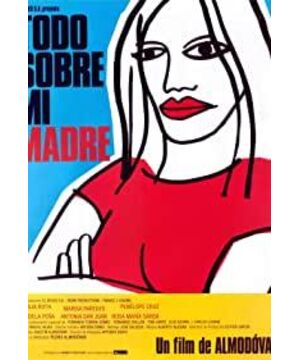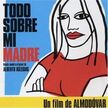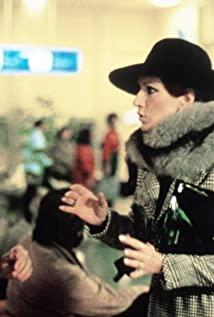From a narrative point of view, Almodovar's films are almost always narrative. From "Tie Me and Tie Me" to "Living Beauty", to "Everything About My Mother", and "Speaking to Her" and the recent "Return", we can see his There is always a clear timeline in the film. For example, in "Everything About My Mother", the heroine in the film constantly confesses the past during the narration process. Different women mention the same man, and each recalls different sad things, but the main line of the story remains. The structure of the sequence and the explanation of the background are often expressed in the language of the characters, making the content of the film rich and full without procrastination. This structure is very suitable for the way of thinking of female audiences, to maximize the understanding of the content of the story in the shortest time.
So, how is "All About My Mother" a movie about women?
First of all, the protagonist is a woman.
There is no doubt about this. Almodovar only shoots stories about women. In the film, the male role is completely downplayed. Look at several characters in the film: Cecilia Roth played Manuela, a single mother; Penelope Cruz played Lusa, a young girl who had an indifferent relationship with her parents; and Marisa Pardes played the "mummy" Actress and gay. And the men appearing in the film: First is Manuela’s son, this is the only masculine and energetic boy in the film, but the director arranged for the tragedy of a car accident early; transgender Nina, although she still retains the male reproductive organs , But she has spent a lot of money to transform herself into a woman and face the public as a woman. Her speech on the stage is a true portrayal of her female psychology; there is also Lola who made the heroine and the supporting actress pregnant. But Laura obviously already has fake breasts and is already longing to be a woman; in addition, there is also Lusa's father, who has Alzheimer's disease. He doesn't even know his own daughter, and the recognition rate of personnel is not as good as that of the dog. In the usual social life, the dominant male roles such as father, husband, son, boyfriend, and boss have been completely in a secondary role in the film.
Second, the way in which emotions are handled is female.
Since the story is told from a female perspective, the processing of emotions must be integrated with a female perspective. In Almodovar's films, all women are unusually strong but not hard-hearted. Whenever they encounter problems, out of instinct, they will have a vulnerable side, but they can calm down quickly. This seems to have the shadow of the spirit of the ancient Greek sun god. Although everything encountered will make the feelings addicted to it, it will not be overly addictive. When it comes to what to do, it will immediately be shocked and calm, and will always be able to maintain a sense of reason. This emotion is not only reflected in Manuela in the film. In "Return", after the daughter accidentally killed his stepfather, Penelope calmly buried her husband's body.
Again, there is a female instinctive sense of belonging hidden in this film.
Although all the male characters in the film are ignored, when they encounter problems, they can immediately start to stand alone. Manuela is a single mother, but she can fulfill her son's wish after the loss of her son; Lusa has AIDS and is pregnant, but she can leave the family to seek assistance; Lusa's mother has to support the family and take care of her mentally handicapped husband. In the whole film, apart from the confusion about the mother-daughter relationship, there is absolutely no weakness at all. At the beginning of the film, she even strongly deserves to refuse Manuela to help at home. She is also a woman with her own spirit and persistence. This group is in the dominant position in the film. When they encounter problems, they do not shrink and compromise, but bravely face them and solve them.
When they realize that they are in a dominated weak position in a female role, they begin to awaken. As their self-awareness grows stronger, they begin to explore, fight, and even become deformed (for example, Cecila Roth's role in "The Passion Labyrinth"). This self-consciousness constantly reminds women of their independence, and they choose to be strong and independent for their lives.
However, the root of all this strength and singularity is the female instinctive sense of belonging: everything Manuela does is for his son; everything Lusha does is because of her love for a man; the focus of her mother’s life It's all around her husband. In the film, in order to keep her husband satisfied, she even tells him that her grandson is Manuela's child, and Manuela is the family chef. When she saw that her daughter's lover (let's say Lola is Lusa's lover) is a transgender person, her reaction was fierce. She may not be able to understand how such a man is the focus of her daughter's life.
So, did Lola hurt them?
I think that injury is inevitable, but over time they put the sense of injury to a secondary position. Manuela followed Lola, even if he saw him with a prosthetic breast, he was fearless, but he resolutely left him after he became pregnant. I think, on the one hand, she has a new pillar, and on the other hand, Lola's harm to her can be secondary at that moment because of the change in the focus of life. Hegel once said: The trauma of the spirit is completely healed. This kind of behavior is not lasting; when the spirit no longer has this kind of action, the particularity (individuality) contained in it disappears immediately (Hegel's "Phenomenology of Spirit"). With the passage of time, with the appearance of her son, Laura's harm to Manuela has been gradually buried in her memory. It was not until the death of her son that she was awakened to have this unfulfilled fate.
Manuela decided to find Laura. In the process, she discovered that she was not the only one who changed her life because of Laura. They understood and tolerated each other. When she finally saw Laura, she didn't blame him, the blame was meaningless, she just stated the facts. Laura is a person who wants to live his own way, which is destined to be incompatible with the world. But after all, Manuela settled with him. Hegel once said that the guarantee of reconciliation is the spirit of objective survival, which in its opposite grasps the pure knowledge of itself as the universal essence... This mutual recognition is the absolute spirit.
In the end, it doesn't matter who is right or who is wrong. Manuela has another child and life still has to go on.
How does the film itself express so much content?
First of all, "Desire's Pickup" is the main line of thought in the film.
It is true that "A Streetcar Named Desire" is the fuse of the story. Manuela became acquainted with Laura because of his role in "A Streetcar Named Desire", and because of "A Streetcar Named Desire", he lost his son, and because of him he met Mommy and Nina. It can be said that this drama has connected her life.
Why did the director choose "A Streetcar Named Desire"? The author of "A Streetcar Named Desire" is Tennessee Williams. He is a gay and deeply in love with Frank Meg. When Frank died, Tennessee said that Frank died and he died too. But it was the famous writer Capote who introduced them. In the film, the author of the book Manuela gave him on his son's birthday is Capote.
Manuela met him because Lola played Stanney. In the play, Stanney is tyrannical, and the heroine Brown Xu is even more bitter. She said in the play: "No matter who you are, I always believe in the kindness of strangers." Capote is even more like this: "Full of lust, full of sorrow." In the film, Manuela once played a supporting role, that is, the role played by Mommy's gay partner; Mommy played Blanche. When her partner Nina just ignored her by taking drugs and abandoned her, she chose to trust Manuela, who met by the water, and Manuela replaced Nina on the stage. Nina finally left, just as Frank Meg left Tennessee.
In the film, Lusa, who is also related to Lola, would rather ask for help from the unknown Manuela than to her mother when she was down. She is alienated from the family, but trusts a stranger. When she found that her father could not recognize her, she did not explain, but just said: "Dad, goodbye!" But she left the matter behind to Manuela. Isn't this also a portrayal of "A Streetcar Named Desire"?
Almodovar used "A Streetcar Named Desire" as a prop to explain the subtle emotions of the characters in the film. . Manuela watched "A Streetcar Named Desire" twice, one for Manuela with his son on his son's birthday, and the other for her alone. The same actor, the same plot, and even the same one next to him. As, but separated by heaven and man. This technique is also used in many of his other films, such as the pioneer ballet in "Speak to Her".
Secondly, the three Rasbands tell the story clearly.
Laura's name is Rasband, Manuela's son is also Rasband, and Luca's son is still named Rasband. Among the three Rasbands, one is a transgender addict, one is a son who died in a car accident, and the other is a baby in a swaddle. The three of them are the most important male protagonists in the film, but they are extremely weak. The only son, Rasband, who can give comfort and support, was arranged for a car accident by the director. It is precisely because of the car accident that the story can be carried out, and it can also reflect Manuela's independent spirit. After Manuela became pregnant, he chose to raise the child alone; after the loss of her son, she fulfilled her son's wish; after Lusha died, she resolutely took the little Rasband to find a better living environment. The man became disadvantaged, but life The center of gravity is still because of them.
Third, the relationship with women reflects Manuela's character.
Manuela is a combination of rigidity and softness, which is reflected in her relationship with women.
The female characters in the film are in distress when they meet Manuela: Ayue and her are injured when they meet again; Lusa is pregnant and has AIDS; the actor Mummy is in a deep emotional quagmire. In this situation, Manuela's appearance helped them in a timely manner and gained their trust. .
Therefore, it is easy for us to see Manuela's tough side from her relationship with the women around. Her emotional way is destined to be full of searching. This kind of search means that we can see in many movies, such as "Broken Flower" by Jamusch and "Paris of Texas" by Wenders, but there is no one like this film that can be seen. Such a strong force is commendable.
View more about All About My Mother reviews











